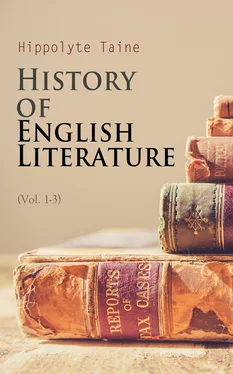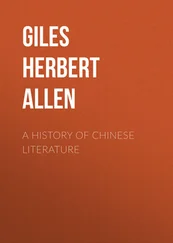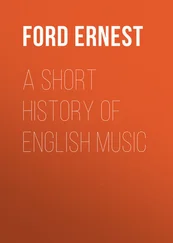Hippolyte Taine - History of English Literature (Vol. 1-3)
Здесь есть возможность читать онлайн «Hippolyte Taine - History of English Literature (Vol. 1-3)» — ознакомительный отрывок электронной книги совершенно бесплатно, а после прочтения отрывка купить полную версию. В некоторых случаях можно слушать аудио, скачать через торрент в формате fb2 и присутствует краткое содержание. Жанр: unrecognised, на английском языке. Описание произведения, (предисловие) а так же отзывы посетителей доступны на портале библиотеки ЛибКат.
- Название:History of English Literature (Vol. 1-3)
- Автор:
- Жанр:
- Год:неизвестен
- ISBN:нет данных
- Рейтинг книги:3 / 5. Голосов: 1
-
Избранное:Добавить в избранное
- Отзывы:
-
Ваша оценка:
- 60
- 1
- 2
- 3
- 4
- 5
History of English Literature (Vol. 1-3): краткое содержание, описание и аннотация
Предлагаем к чтению аннотацию, описание, краткое содержание или предисловие (зависит от того, что написал сам автор книги «History of English Literature (Vol. 1-3)»). Если вы не нашли необходимую информацию о книге — напишите в комментариях, мы постараемся отыскать её.
History of English Literature (Vol. 1-3) — читать онлайн ознакомительный отрывок
Ниже представлен текст книги, разбитый по страницам. Система сохранения места последней прочитанной страницы, позволяет с удобством читать онлайн бесплатно книгу «History of English Literature (Vol. 1-3)», без необходимости каждый раз заново искать на чём Вы остановились. Поставьте закладку, и сможете в любой момент перейти на страницу, на которой закончили чтение.
Интервал:
Закладка:
Such is the second step, and we are now in train to follow it out. Such is the proper aim of contemporary criticism. No one has done this work so judiciously and on so grand a scale as Sainte-Beuve; in this respect, we are all his pupils; literary, philosophic, and religious criticism in books, and even in the newspapers, is to-day entirely changed by his method. Ulterior evolution must start from this point. I have often attempted to expose what this evolution is; in my opinion, it is a new road open to history and which I shall strive to describe more in detail.
III. The state and the actions of the inner and invisible man have their causes in certain general ways of thought and feeling
Table of Contents
After having observed in a man and noted down one, two, three, and then a multitude of, sentiments, do these suffice and does your knowledge of him seem complete? Does a memorandum book constitute a psychology? It is not a psychology, and here, as elsewhere, the search for causes must follow the collection of facts. It matters not what the facts may be, whether physical or moral, they always spring from causes; there are causes for ambition, for courage, for veracity, as well as for digestion, for muscular action, and for animal heat. Vice and virtue are products like vitriol and sugar; every complex fact grows out of the simple facts with which it is affiliated and on which it depends. We must therefore try to ascertain what simple facts underlie moral qualities the same as we ascertain those that underlie physical qualities, and, for example, let us take the first fact that comes to hand, a religious system of music, that of a Protestant church. A certain inward cause has inclined the minds of worshippers towards these grave, monotonous melodies, a cause much greater than its effect; that is to say, a general conception of the veritable outward forms of worship which man owes to God; it is this general conception which has shaped the architecture of the temple, cast out statues, dispensed with paintings, effaced ornaments, shortened ceremonies, confined the members of a congregation to high pews which cut off the view, and governed the thousand details of decoration, posture, and all other externals. This conception itself again proceeds from a more general cause, an idea of human conduct in general, inward and outward, prayers, actions, dispositions of every sort that man is bound to maintain toward the Deity; it is this which has enthroned the doctrine of grace, lessened the importance of the clergy, transformed the sacraments, suppressed observances, and changed the religion of discipline into one of morality. This conception, in its turn, depends on a third one, still more general, that of moral perfection as this is found in a perfect God, the impeccable judge, the stern overseer, who regards every soul as sinful, meriting punishment, incapable of virtue or of salvation, except through a stricken conscience which He provokes and the renewal of the heart which He brings about. Here is the master conception, consisting of duty erected into the absolute sovereign of human life, and which prostrates all other ideals at the feet of the moral ideal. Here we reach what is deepest in man; for, to explain this conception, we must consider the race he belongs to, say the German, the Northman, the formation and character of his intellect, his ways in general of thinking and feeling, that tardiness and frigidity of sensation which keeps him from rashly and easily falling under the empire of sensual enjoyments, that bluntness of taste, that irregularity and those outbursts of conception which arrest in him the birth of refined and harmonious forms and methods; that disdain of appearances, that yearning for truth, that attachment to abstract, bare ideas which develop conscience in him at the expense of everything else. Here the search comes to an end. We have reached a certain primitive disposition, a particular trait belonging to sensations of all kinds, to every conception peculiar to an age or to a race, to characteristics inseparable from every idea and feeling that stir in the human breast. Such are the grand causes, for these are universal and permanent causes, present in every case and at every moment, everywhere, and always active, indestructible, and inevitably dominant in the end, since, whatever accidents cross their path, being limited and partial, end in yielding to the obscure and incessant repetition of their energy; so that the general structure of things and all the main features of events are their work, all religions and philosophies, all poetic and industrial systems, all forms of society and of the family, all, in fine, being imprints bearing the stamp of their seal.
IV. Chief causes of thought and feeling. Their historical effects
Table of Contents
There is, then, a system in human ideas and sentiments, the prime motor of which consists in general traits, certain characteristics of thought and feeling common to men belonging to a particular race, epoch, or country. Just as crystals in mineralogy, whatever their diversity, proceed from a few simple physical forms, so do civilizations in history, however these may differ, proceed from a few spiritual forms. One is explained by a primitive geometrical element as the other is explained by a primitive psychological element. In order to comprehend the entire group of mineralogical species we must first study a regular solid in the general, its facets and angles, and observe in this abridged form the innumerable transformations of which it is susceptible. In like manner, if we would comprehend the entire group of historic varieties we must consider beforehand a human soul in the general, with its two or three fundamental faculties, and, in this abridgment, observe the principal forms it may present. This sort of ideal tableau, the geometrical as well as psychological, is not very complex, and we soon detect the limitations of organic conditions to which civilizations, the same as crystals, are forcibly confined. What do we find in man at the point of departure? Images or representations of objects, namely, that which floats before him internally, lasts a certain time, is effaced, and then returns after contemplating this or that tree or animal, in short, some sensible object. This forms the material basis of the rest and the development of this material basis is twofold, speculative or positive, just as these representations end in a general conception or in an active resolution. Such is man, summarily abridged. It is here, within these narrow confines, that human diversities are encountered, now in the matter itself and again in the primordial twofold development. However insignificant in the elements they are of vast significance in the mass, while the slightest change in the factors leads to gigantic changes in the results. According as the representation is distinct, as if stamped by a coining-press, or confused and blurred; according as it concentrates in itself a larger or smaller number of the characters of an object; according as it is violent and accompanied with impulsions or tranquil and surrounded with calmness, so are all the operations and the whole running-gear of the human machine entirely transformed. In like manner again, according as the ulterior development of the representation varies, so does the whole development of the man vary. If the general conception in which this ends is merely a dry notation in Chinese fashion, language becomes a kind of algebra, religion and poetry are reduced to a minimum, philosophy is brought down to a sort of moral and practical common sense, science to a collection of recipes, classifications, and utilitarian mnemonics, the mind itself taking a wholly positive turn. If, on the contrary, the general conception in which the representation culminates is a poetic and figurative creation, a living symbol, as with the Aryan races, language becomes a sort of shaded and tinted epic in which each word stands as a personage, poesy and religion assume magnificent and inexhaustible richness, and metaphysics develops with breadth and subtlety without any consideration of positive bearings; the whole intellect, notwithstanding the deviation and inevitable weaknesses of the effort, is captivated by the beautiful and sublime, thus conceiving an ideal type which, through its nobleness and harmony, gathers to itself all the affections and enthusiasms of humanity. If, on the other hand, the general conception in which the representation culminates is poetic but abrupt, is reached not gradually but by sudden intuition, if the original operation is not a regular development but a violent explosion—then, as with the Semitic races, metaphysical power is wanting; the religious conception becomes that of a royal God, consuming and solitary; science cannot take shape, the intellect grows rigid and too headstrong to reproduce the delicate ordering of nature; poetry cannot give birth to aught but a series of vehement, grandiose exclamations, while language no longer renders the concatenation of reasoning and eloquence, man being reduced to lyric enthusiasm, to ungovernable passion, and to narrow and fanatical action. It is in this interval between the particular representation and the universal conception that the germs of the greatest human differences are found. Some races, like the classic, for example, pass from the former to the latter by a graduated scale of ideas regularly classified and more and more general; others, like the Germanic, traverse the interval in leaps, with uniformity and after prolonged and uncertain groping. Others, like the Romans and the English, stop at the lowest stages; others, like the Hindoos and Germans, mount to the uppermost. If, now, after considering the passage from the representation to the idea, we regard the passage from the representation to the resolution, we find here elementary differences of like importance and of the same order, according as the impression is vivid, as in Southern climes, or faint, as in Northern climes, as it ends in instantaneous action as with barbarians, or tardily as with civilized nations, as it is capable or not of growth, of inequality, of persistence and of association. The entire system of human passion, all the risks of public peace and security, all labor and action, spring from these sources. It is the same with the other primordial differences; their effects embrace an entire civilization, and may be likened to those algebraic formulæ which, within narrow bounds, describe beforehand the curve of which these form the law. Not that this law always prevails to the end; sometimes, perturbations arise, but, even when this happens, it is not because the law is defective, but because it has not operated alone. New elements have entered into combination with old ones; powerful foreign forces have interfered to oppose primitive forces. The race has emigrated, as with the ancient Aryans, and the change of climate has led to a change in the whole intellectual economy and structure of society. A people has been conquered like the Saxon nation, and the new political structure has imposed on it customs, capacities, and desires which it did not possess. The nation has established itself permanently in the midst of downtrodden and threatening subjects, as with the ancient Spartans, while the necessity of living, as in an armed encampment, has violently turned the whole moral and social organization in one unique direction. At all events, the mechanism of human history is like this. We always find the primitive mainspring consisting of some widespread tendency of soul and intellect, either innate and natural to the race or acquired by it and due to some circumstance forced upon it. These great given mainsprings gradually produce their effects, that is to say, at the end of a few centuries they place the nation in a new religious, literary, social, and economic state; a new condition which, combined with their renewed effort, produces another condition, sometimes a good one, sometimes a bad one, now slowly, now rapidly, and so on; so that the entire development of each distinct civilization may be considered as the effect of one permanent force which, at every moment, varies its work by modifying the circumstances where it acts.
Читать дальшеИнтервал:
Закладка:
Похожие книги на «History of English Literature (Vol. 1-3)»
Представляем Вашему вниманию похожие книги на «History of English Literature (Vol. 1-3)» списком для выбора. Мы отобрали схожую по названию и смыслу литературу в надежде предоставить читателям больше вариантов отыскать новые, интересные, ещё непрочитанные произведения.
Обсуждение, отзывы о книге «History of English Literature (Vol. 1-3)» и просто собственные мнения читателей. Оставьте ваши комментарии, напишите, что Вы думаете о произведении, его смысле или главных героях. Укажите что конкретно понравилось, а что нет, и почему Вы так считаете.












